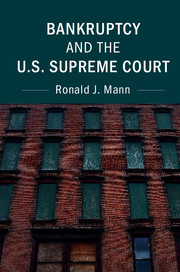Book contents
- Frontmatter
- Contents
- List of Figures
- List of Tables
- Preface
- Introduction
- PART I SETTING THE STAGE
- PART II THE HARD CASES
- SECTION A MISSED OPPORTUNITIES: CONGRESS, THE COURT, AND THE BANKRUPTCY CLAUSE
- SECTION B INTERPRETIVE STRATEGY: THE COURT, THE SOLICITOR GENERAL, AND THE CODE
- PART III AMICI AND THE COURT
- 12 The Supreme Court, the Solicitor General, and Statutory Interpretation
- 13 Learning from Amici
- PART IV CONCLUSION
13 - Learning from Amici
from PART III - AMICI AND THE COURT
Published online by Cambridge University Press: 04 May 2017
- Frontmatter
- Contents
- List of Figures
- List of Tables
- Preface
- Introduction
- PART I SETTING THE STAGE
- PART II THE HARD CASES
- SECTION A MISSED OPPORTUNITIES: CONGRESS, THE COURT, AND THE BANKRUPTCY CLAUSE
- SECTION B INTERPRETIVE STRATEGY: THE COURT, THE SOLICITOR GENERAL, AND THE CODE
- PART III AMICI AND THE COURT
- 12 The Supreme Court, the Solicitor General, and Statutory Interpretation
- 13 Learning from Amici
- PART IV CONCLUSION
Summary
The previous chapter suggests that it is not merely an institutional vacuum that plagues the bankruptcy system. Rather, the Solicitor General is an affirmatively adversarial institution, more likely to identify with the creditors seeking to narrow the relief that the system can provide than with the debtors for the relief of whom the system is designed. As a result, the Solicitor General is not providing the system-justifying information that the Court typically receives from administrative agencies. The natural question is whether other amici fill that gap, a question to which this chapter turns.
In an effort to shed some light on that question, I have examined the opinions, briefs, and transcripts in all of the Supreme Court's bankruptcy cases. The goal is to understand how often, from whom, and for what purpose the Court uses information from the briefs that amici file and the arguments that they present. Recognizing the roughness of the proxy, I decided to use the Court's citations as a gauge of where it gets the inputs that it uses to decide the cases before it. I have examined each of the citations that appear in the Court's opinions in the bankruptcy cases (about 3500 in all) and then allocated those citations into three groups. The first are sources that appear in the briefs of the parties to the case. For my purposes, those sources are of relatively little interest. When the Court refers to sources that the parties cite, it is as likely as not (or at least difficult to rebut) that the sources define a baseline of relatively obvious information available without any special contribution or expertise. The second are sources that do not appear in the briefs of the parties, but do appear in the briefs of amici; it is reasonable to think, for the most part, that the Court found those sources in the briefs of the amici. Those citations are evidence, albeit imperfect, that the amici have provided information that the Court has used, in the form of references to sources that are instructive to at least some of the Justices in resolving the questions before the Court.
- Type
- Chapter
- Information
- Bankruptcy and the U.S. Supreme Court , pp. 210 - 230Publisher: Cambridge University PressPrint publication year: 2017



